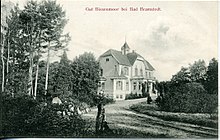Georg Vollerthun
Georg Vollerthun (born September 29, 1876 in Fürstenau (today Kmiecin, district of Nowy Dwór Gdański ) near Danzig ; † September 15, 1945 in Strausberg near Berlin ) was a German composer , conductor and music teacher.
Life
Georg Vollerthun - son of a landowner - studied at the Stern Conservatory in Berlin with Friedrich Gernsheim and Robert Radeke. From 1899 to 1905 Vollerthun had engagements as a theater conductor in Prague, Berlin, Barmen and Mainz. After a two-year stay in Paris, he lived on the Bissenmoor estate near Bad Bramstedt from 1910 . Vollerthun lived in Strausberg from 1922 . From 1919 to 1922 he was a member of the DNVP . The NSDAP stepped Vollerthun on September 1 in 1931 (Nr.666.098) and worked as a music critic of the party in the district Oberbarnim . In the Kampfbund für deutsche Kultur he was responsible for the opera from 1932 as a department head.
During the National Socialist era , Vollerthun was one of the composers most supported by the regime. Since November 1, 1933, he has held a professorship for German song at the Berlin University of Music ; one of his students there was Elisabeth Schwarzkopf . In 1934 he became a member of the Great Council of the German Composers' Profession within the Reich Chamber of Music . In 1936 he was given a forced leave of absence for violating a “criminalized moral norm”, and his works were boycotted by the Reichsrundfunk . However, the boycott was lifted on December 17, 1936 by the Propaganda Minister Joseph Goebbels .
In 1938 Vollerthun's Deutsches Liederspiel was premiered on texts by Agnes Miegel . In 1942 the world premiere of his opera The royal sacrifice about the petition of Queen Luise took place. However, this was banned in East Prussia by the Gauleiter Erich Koch because of the "deepest humiliation and shame of Prussia".
Compositions
Stage works
- Veeda ( op.12 ; 1916). Music drama in 2 acts. Libretto : Georg Kiesau. Premiere 1916 Kassel
- Iceland Saga (op.18; 1925). Music tragedy in 3 acts. Libretto: Berta Thiersch . Premiere January 17, 1925 Munich ( Bavarian State Opera )
- The Free Corporal (op. 21; 1931). Cheerful opera in 3 acts (5 pictures). Libretto: Rudolf Lothar (based on Gustav Freytag ). Premiere November 10, 1931 Hanover
- The royal sacrifice (op. 35; 1942). Opera in 3 acts (4 pictures). Libretto: Oswald Schrenk. Premiere 1942 Hanover
- The King's Page (not listed). Libretto: Oswald Schrenk (based on Conrad Ferdinand Meyer )
- The Wismar organ
Orchestral works
- Orchestral Suite Alt-Danzig (op.25; WP 1938)
Piano compositions
- Baroque suite for piano (op.29; 1936)
Vocal compositions
- Cantatas
- Choral works
- Songs, etc. a .:
- Love Chants , No. 1–8 (op. 2)
- Song circles after Agnes Miegel (1st: op.16, 2nd: op.19; 3rd: op.20, 4th op.?)
- Songs of Grace (op.24)
- 4 songs from Low Germany (op.27)
- Songs of Devotion (op.31, after Carl Lange)
Web links
- Literature by and about Georg Vollerthun in the catalog of the German National Library
Individual evidence
- ↑ a b c d e Fred K. Prieberg : Handbook of German Musicians 1933–1945 , CD-Rom-Lexikon, Kiel 2004, p. 7.418.
- ^ Ernst Klee : The culture lexicon for the Third Reich. Who was what before and after 1945. S. Fischer, Frankfurt am Main 2007, ISBN 978-3-10-039326-5 , p. 633.
- ↑ Michael H. Kater: The abused muse. Musician in the Third Reich . Munich (Europa Verlag) 1998
- ↑ Fred K. Prieberg: Handbook of German Musicians 1933–1945 , p. 7.422.
- ↑ Fred K. Prieberg: Handbook of German Musicians 1933–1945 , pp. 7.422–7.423.
- ↑ Fred K. Prieberg: Handbook of German Musicians 1933–1945 , p. 7.424.
| personal data | |
|---|---|
| SURNAME | Vollerthun, Georg |
| BRIEF DESCRIPTION | German composer, conductor and music teacher |
| DATE OF BIRTH | September 29, 1876 |
| PLACE OF BIRTH | Fürstenau (today Kmiecin, district of Nowy Dwór Gdański ) near Danzig |
| DATE OF DEATH | September 15, 1945 |
| Place of death | Strausberg near Berlin |
